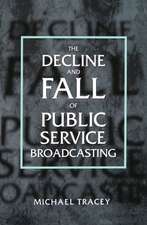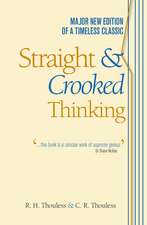The Labyrinths of Information: Challenging the Wisdom of Systems
Autor Claudio Ciborraen Limba Engleză Hardback – 27 iun 2002
| Toate formatele și edițiile | Preț | Express |
|---|---|---|
| Paperback (1) | 340.40 lei 31-37 zile | |
| OUP OXFORD – 23 sep 2004 | 340.40 lei 31-37 zile | |
| Hardback (1) | 848.23 lei 31-37 zile | |
| OUP OXFORD – 27 iun 2002 | 848.23 lei 31-37 zile |
Preț: 848.23 lei
Preț vechi: 1327.74 lei
-36% Nou
Puncte Express: 1272
Preț estimativ în valută:
162.33€ • 168.85$ • 134.01£
162.33€ • 168.85$ • 134.01£
Carte tipărită la comandă
Livrare economică 03-09 aprilie
Preluare comenzi: 021 569.72.76
Specificații
ISBN-13: 9780199241521
ISBN-10: 019924152X
Pagini: 214
Ilustrații: 1 figure; 2 tables
Dimensiuni: 145 x 224 x 17 mm
Greutate: 0.36 kg
Editura: OUP OXFORD
Colecția OUP Oxford
Locul publicării:Oxford, United Kingdom
ISBN-10: 019924152X
Pagini: 214
Ilustrații: 1 figure; 2 tables
Dimensiuni: 145 x 224 x 17 mm
Greutate: 0.36 kg
Editura: OUP OXFORD
Colecția OUP Oxford
Locul publicării:Oxford, United Kingdom
Recenzii
A unique and penetrating look at the ways that the ideal clashes with the real yielding a steady stream of innovations or disasters. Ciborra brings his rich understanding of bricolage and phenomenology to the fore in providing fresh insights about organizations and the building and use of complex information systems. Highly recommended.
Claudio Ciborra has a more detailed, nuanced, and sophisticated understanding of the dynamics associated with information technology in today's organizations than any scholar working in the field today. His work is grounded in ultra realism, but his observations are interpreted through classical schema that provide immense illumination. The effect is a series of highly literate jewel-like essays that are intellectually fascinating but could also change the life of any practitioner who bothered to read and ponder.
This is a book about how the untidy persists within hi-tech solutions, and about how human improvisation is dynamically related to technical systems. Claudio Ciborra provides us with a compelling analysis that marries an "anthropology of uncertainty" to the understanding of information systems. This brilliant book is a tour de force that propels information systems into the heart of the social sciences.
Knowledge management is not about shopping around for state-of-the-art IT. It is about human beings with differing viewpoints. Ciborra's book . . . elaborately explains this, and also how we should change our perspectives and attitudes towards information and knowledge in this new century. An excellent book.
Information systems are just the entry point for Claudio Ciborra to take us on a ride through the myths of order and rationality that permeate management practice and dominate our espoused mode of existence. Using powerful metaphors and taking a real and messy world - as opposed to an idealised one - as a starting point, he draws the contours of a higher-level road map. This book is deeply threatening and disturbing in laying bare so many erroneous assumptions and practices, but it ultimately brings a hopeful message. . . . a must for the next generation of leaders.
Ciborra invites us to see through the systems, methods, and boxes of standard organization lore into the buzzing, emotional, and political improvisation in today´s networked organizations. He does so to help us make sense of the current uses of information technology. The book is both theoretically more interesting and more practical than most writing on the subject. Ciborra is refreshing, original and great fun to read.
Reading Ciborra gives, even to person who has been in this Industry for many years, a new vision of Information Technology and its impact on organizations and on every human being.
Claudio Ciborra has a more detailed, nuanced, and sophisticated understanding of the dynamics associated with information technology in today's organizations than any scholar working in the field today. His work is grounded in ultra realism, but his observations are interpreted through classical schema that provide immense illumination. The effect is a series of highly literate jewel-like essays that are intellectually fascinating but could also change the life of any practitioner who bothered to read and ponder.
This is a book about how the untidy persists within hi-tech solutions, and about how human improvisation is dynamically related to technical systems. Claudio Ciborra provides us with a compelling analysis that marries an "anthropology of uncertainty" to the understanding of information systems. This brilliant book is a tour de force that propels information systems into the heart of the social sciences.
Knowledge management is not about shopping around for state-of-the-art IT. It is about human beings with differing viewpoints. Ciborra's book . . . elaborately explains this, and also how we should change our perspectives and attitudes towards information and knowledge in this new century. An excellent book.
Information systems are just the entry point for Claudio Ciborra to take us on a ride through the myths of order and rationality that permeate management practice and dominate our espoused mode of existence. Using powerful metaphors and taking a real and messy world - as opposed to an idealised one - as a starting point, he draws the contours of a higher-level road map. This book is deeply threatening and disturbing in laying bare so many erroneous assumptions and practices, but it ultimately brings a hopeful message. . . . a must for the next generation of leaders.
Ciborra invites us to see through the systems, methods, and boxes of standard organization lore into the buzzing, emotional, and political improvisation in today´s networked organizations. He does so to help us make sense of the current uses of information technology. The book is both theoretically more interesting and more practical than most writing on the subject. Ciborra is refreshing, original and great fun to read.
Reading Ciborra gives, even to person who has been in this Industry for many years, a new vision of Information Technology and its impact on organizations and on every human being.
Notă biografică
Claudio Ciborra graduated in Electronic Engineering at the Politecnico di Milano, Italy, before pursuing his studies in management, economics, and organization theory at the University of California, Los Angeles and Harvard University. He has held teaching positions at a number of Italian universities and been a Visiting Professor in many European and American universities. He is currently Chair Professor of Information Systems and Professor at the Centre for the Analysis of Risk and Regulation at the London School of Economics and Professor at IULM in Milan. He has carried out extensive research in the fields of new technologies, organizational structures, learning, knowledge, and change.














